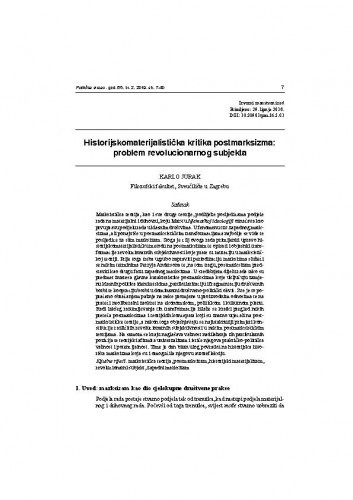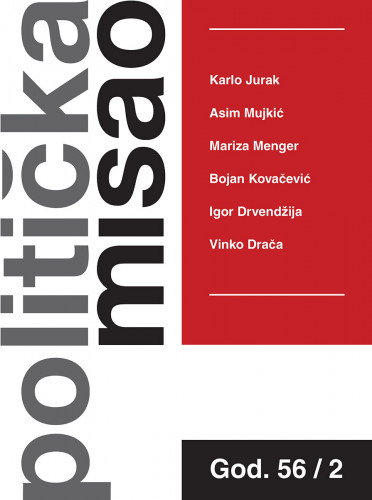Marksistička teorija, kao i sve druge teorije, podliježe posljedicama podjele rada na materijalni i duhovni, koju Marx u Njemačkoj ideologiji označava kao prvu pravu podjelu rada u klasnim društvima. U fenomenu tzv. zapadnog marksizma, ali ponajviše u postmarksističkim transformacijama najbolje se vide te posljedice za sâm marksizam. Stoga je cilj ovoga rada primijeniti upravo historijskomaterijalističku metodu na postmarksizam te opisati i objasniti transformacije revolucionarnih subjektivnosti koje prate tu mutaciju u marksističkoj teoriji. Prije toga treba ugrubo napraviti periodizaciju marksizma služeći se nekim terminima Perryja Andersona te, na tom tragu, postmarksizam predstaviti kao drugu fazu zapadnog marksizma. U središnjem dijelu rada tako su predmet interesa glavne karakteristike postmarksizma koje uključuju zamjenu klasnih politika identitetskima, partikularizaciju i fragmentaciju društvenih borbi te kooptaciju borbi u dominantni društveno-politički okvir. Sve je to popraćeno obraćanjem pažnje na neke promjene u proizvodnim odnosima te na prateći neoliberalni zaokret na ekonomskom, političkom i kulturnom planu. Radi lakšeg razumijevanja tih transformacija izlaže se kratki pregled nekih preteča postmarksizma i teorijskih koncepata koji su znatno utjecali na postmarksističke teorije, a nakon toga objašnjavaju se najistaknutiji primjeri konstitucije različitih revolucionarnih subjektivnosti u nekim postmarksističkim teorijama. Na samom se kraju naglašava važnost nadilaženja tih partikularnih pozicija te teorijski afirmira univerzalizam i ističe njegova praktičko-politička važnost i potencijalnost. Time je dan bitan ulog povratku na historijska izvorišta marksizma koja su i omogućila njegovu autorefleksiju.; Marxist theory, as all other theories, is subject to the consequences of the division of labour into the material and the mental one. In The German Ideology Marx marked this division as the first real division of labour in class societies. Regarding Marxism itself, the consequences of this division are very obvious especially within the phenomenon of so-called Western Marxism, but most of all in post-Marxist transformations. Therefore, the aim of this paper is to apply the method of historical materialism to post-Marxism itself and to describe and explain the transformations of revolutionary subjectivities which follow this mutation in Marxist theory. Before that, it is necessary to roughly outline the periodization of Marxism relying on some terms coined by Perry Anderson and, on that trajectory, to present post-Marxism as the second phase of Western Marxism. Thus, the central part of the paper focuses on the main characteristics of post-Marxism such as replacement of class politics with identity politics, the particularisation and fragmentation of social struggles, and their cooptation in the dominant socio-political framework. All of that is accompanied by remarks on some changes in the relations of production and the concomitant neoliberal turn in the economic, political and cultural agenda. In order to allow for a better understanding of it all, a short review of some post-Marxist forerunners and theoretical concepts which have noticeably influenced post-Marxist theories is offered. This is followed by explanations of the most prominent examples of the constitution of different revolutionary subjectivities in some post-Marxist theories. Finally, the necessity of overcoming these particular positions and theoretically affirming universalism, including its practico-political importance and potentiality, is emphasized. This paves the way for the return to the historical sources of Marxism, which are what allowed for its auto-reflexivity in the first place.
Sažetak

 Politička misao : Croatian political science review : 56,2(2019) / glavni i odgovorni urednik Dejan Jović.
Politička misao : Croatian political science review : 56,2(2019) / glavni i odgovorni urednik Dejan Jović.